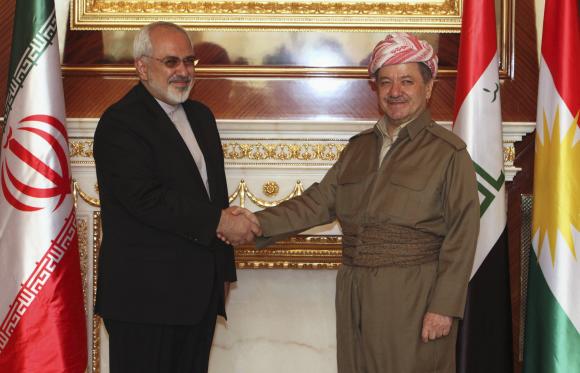
CREDIT: REUTERS/AZAD LASHKARI
(Reuters) – Iran has supplied weapons and ammunition to Iraqi Kurdish forces, Kurdistan President Massoud Barzani said Tuesday at a joint press conference with Iranian foreign minister Mohammad Javad Zarif in Arbil, capital of Iraq’s Kurdish region.
The direct arming of Kurdish forces is a contentious issue because some Iraqi politicians have said they suspect Kurdish leaders have aspirations to break away from the central government completely. The move could also be seen by some as a prelude to Iran taking a more direct role in broader Iraqi conflict.
“We asked for weapons and Iran was the first country to provide us with weapons and ammunition,” Barzani said.
Earlier in the day a car bomb was detonated in a mainly Shi’ite district of eastern Baghdad, killing 12 people and wounding 28, police and medical sources said.
The bombing in the New Baghdad neighborhood followed a series of blasts in the Iraqi capital on Monday which killed more than 20 people.
The Islamic State, which controls large swathes of northern and western Iraq, claimed responsibility for a suicide bombing in the New Baghdad neighborhood on Monday and said in a statement that the attack was carried out as revenge for an attack against a Sunni mosque in Diyala on Friday which killed 68 and wounded dozens.
The Iranian foreign minister held talks with Barzani on Tuesday, one day after visiting senior Shi’ite clerics in southern Iraq. Zarif acknowledged giving military assistance to Iraqi security forces but said the cooperation did not include deploying ground troops in the country.
“We have no military presence in Iraq,” Zarif said. “We do have military cooperation with both the central government and the Kurds in different arenas.”
Neither Zarif nor Barzani gave any details whether weapons supplied to Kurdish peshmerga forces had been routed through the central government or given directly to Kurdish forces. Prime Minister-designate Haider al-Abadi said Monday that arms given to the peshmerga had been routed through the central government.
Britain, France, Germany and Italy have also promised to send military assistance to Kurdish security forces to fight the Islamic State.
The United States has carried out a series of airstrikes against the Islamic State fighters in northern Iraq in the past two weeks, partly to protect the Kurdish region from being overrun.
Zarif denied that Iran and the United States were discussing Iraq as part of talks between Iran and Western powers about Iran’s nuclear program.







